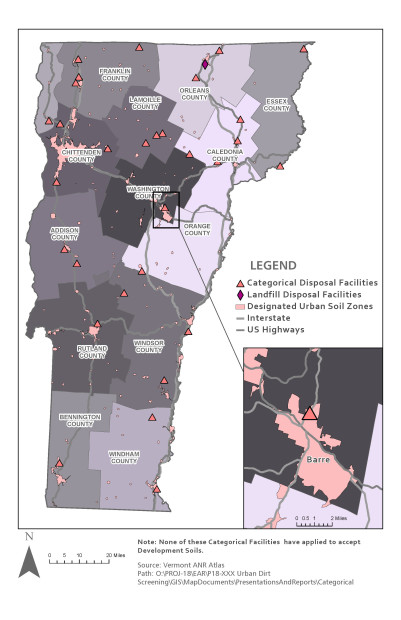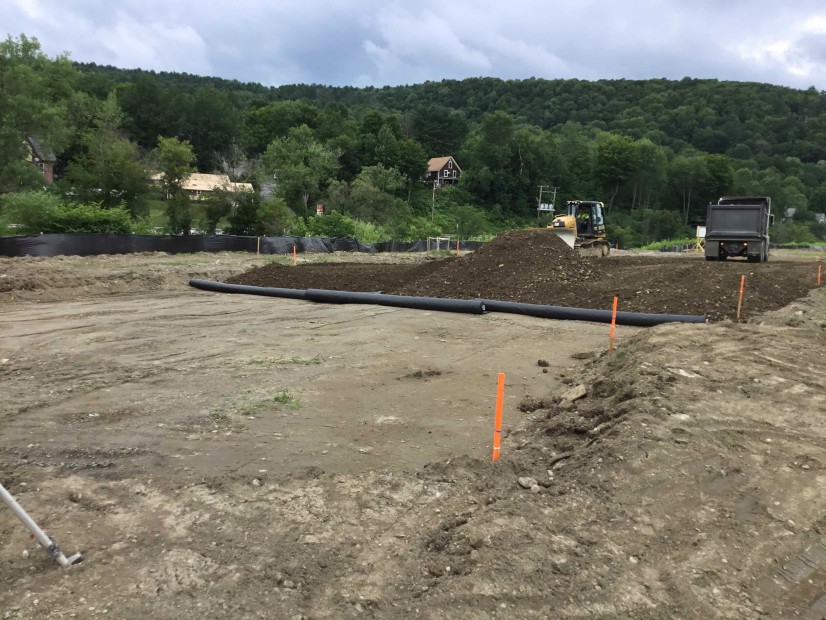Development soils management
“Development soils”—often found on properties within downtowns or village centers in Vermont—can place a considerable burden on communities and developers looking to revitalize abandoned or underutilized sites in compact village or city centers. Frequently containing concentrations of polycyclic aromatic hydrocarbons (PAHs), arsenic, or lead above Vermont Soil Standards, development soils complicate and add costs to redevelopment projects. Traditionally, project owners have had to either assume liability for properly managing these contaminated soils or pay large fees to transfer the development soils to an off-site landfill for disposal.
Since 2015, the State of Vermont has sought to alleviate the burden imposed on development in downtowns and village centers by increasing options for managing development soils. In passing Act 52 (10 V.S.A. § 6604c), the State introduced two additional pathways for managing, transporting, and disposing of excavated development soils beyond on-site management and disposal at Vermont’s only solid waste landfill. These alternatives include transferring the soils from the origin (project) site to either a categorical solid waste facility (“categorical facility”) that has been permitted to accept development soils for disposal or an approved “receiving site” that has similar or higher concentrations of PAHs, arsenic, and lead as compared development soils from the origin site for disposal. While there are currently no “receiving sites” or “categorical facilities” permitted to accept development soils, work is underway to identify potential locations.
At Stone, we are committed to helping property owners, municipalities and developers identify and develop cost-effective solutions for managing development soils. Our team of scientists and engineers have the background and expertise to help clients evaluate on-site soil management and treatment options, as well as opportunities for more affordable, off-site disposal at either a “categorical facility” or “receiving site” in accordance with Vermont’s Investigation and Remediation of Contaminated Properties Rule (IRule).
Our Development Soils Management Support Services Include:
- On-site management and treatment. Our engineers work with developers to design and install engineered barriers as part of the grading plans for site construction, as well as institutional site controls. Where possible, we try and incorporate soil management strategies with the proposed redevelopment design plans and site features, such as balancing cut and fill volumes to avoid the need to transfer contaminated soils to an off-site facility.
- Transport and disposal at a “categorical facility.” We recognize the opportunity for substantial cost savings for developers and municipalities to bring soils to alternative waste facilities for disposal. Several categorical facilities are permitted in the State to receive inert solid waste such as stumps, clean fill, and construction and demolition debris. With a permit amendment through the Vermont Department of Environmental Conservation Solid Waste Management and Prevention Division Solid Waste, these facilities can also accept development soils. Stone is currently engaged with several categorical facilities that are willing to accept development soils at a reduced cost compared to the traditional disposal method at a landfill.
- Transport and disposal at a “receiving site.” Our team can help developers and municipalities navigate the required steps to gain approval, including site characterization (investigation and conceptual site model), waste characterization (soil sampling and analysis under an SPLP Testing Plan), agency coordination, public outreach, reporting, and development and implementation of proposed management plans.
-

There are categorical solid waste facility permitted in Vermont to receive inert waste. With a permit amendment, these facilities would be eligble to also receive development soils.
-
For the Caledonia Spirits Brownfield Redevelopment project, development soils in stockpile were repurposed to grade an overflow parking lot so no soils required off-site disposal.
-
For the Caledonia Spirits Brownfield Redevelopment project, development soils in stockpile were repurposed to grade an overflow parking lot so no soils required off-site disposal.
-

Engineered barriers were also designed to complement civil and architectural designs for the redevelopment project and utilized planned site features including the distillery building, asphalt parking lot, concrete sidewalks, and green spaces with indicator fabric demarcating contaminated soils from clean subgrade and topsoil.
